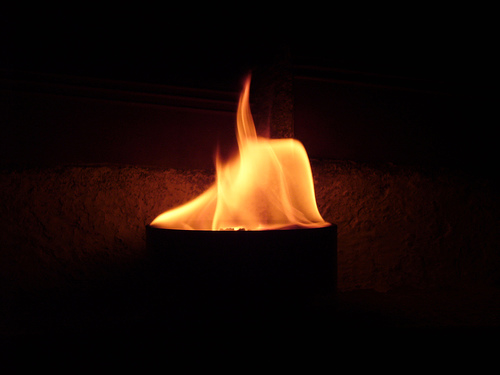FWP:
SETS
CANDLE: {39,1}
JIGAR: {2,1}
MADNESS: {14,3}
MIRROR: {8,3}
For background see S. R. Faruqi's choices. For more on Ghalib's unpublished verses, see the discussion in {4,8x}.
In the first line, the two iẓāfat constructions are metrically required. But what's the relationship between the two resulting phrases? Gyan Chand proposes to take āʾinah-anjām as a noun compound, 'mirror-outcome', meaning 'having an outcome as clearly visible as the image in a mirror'; for more on such noun compound forms, see {129,6x}.
But it's also possible to read them as two separate phrases describing the speaker. He is 'the amazement of a mirror' perhaps because his behavior is so extraordinary that the mirror itself is stupefied when it beholds/reflects him, or perhaps because his behavior itself displays the stupefied 'amazement' characteristic of a mirror (on ḥairat see {51,9x}). And he is the 'outcome of madness' because the madness of his passion has now reached an advanced stage, like a fatal disease.
In any case, the speaker is 'like a candle' in the self-consuming nature of his fiery passion. The inflamed wound of the liver is doing something deadly to him. But the imagery feels conventional and thrown-together; it doesn't integrate itself into the kind of brilliant, strange synthesis characteristic of Ghalib at his best. If S. R. Faruqi hadn't chosen this one, I certainly wouldn't have chosen it myself.
There are some sound effects: junūñ hūñ jyūñ can hardly fail to grab the reader's attention.
Note for grammar fans: The grammar of shuʿlah uṭhātā hai is clear: the liver-wound' causes flame to rise up'. But then normally instead of 'to me' [mujhe] we'd expect something like 'inside me' [mujh meñ or mere andar or the like]. Whereas if we were to see 'causes me to rise up' [uṭhātā hai mujhe] we'd expect a single subject-- either the liver-wound or the flame, but not both. Compare the normal usage of uṭhātā hai mujhe , 'causes me to rise up', in {217,5}. Perhaps in the present verse the tyranny of the rhyming elements has simply proved more oppressive.

Zamin:
The meaning is that the outcome of my madness was that I have become the mirror-outcome of amazement, through which the wound in the liver can be seen flaring up like a flame. The point is that madness caused my hidden burning to flare up and made it manifest; that is, it revealed the secret of passion.
== Zamin, p. 384